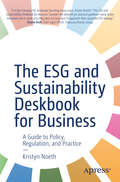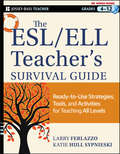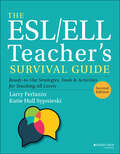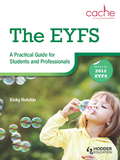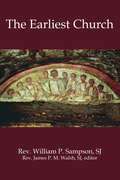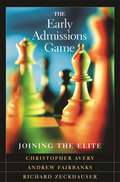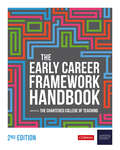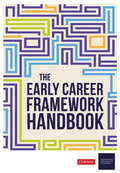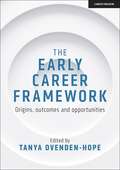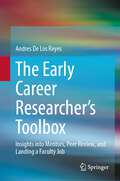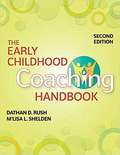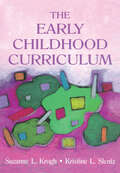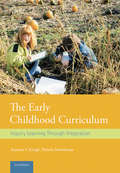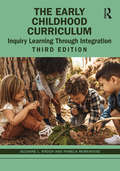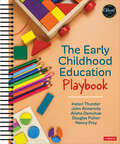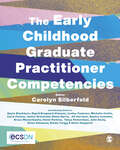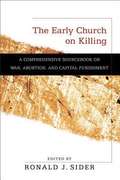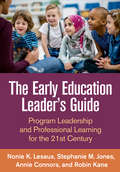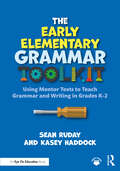- Table View
- List View
The EMC Write-in Reader: Reading Strategies and Test Practice ( Cedar Level)
by Laurie SkibaA Literature and Language Arts textbook, The EMC Write-In Reader offers a rich reading experience, skill development, and standardized test practice.
The ESG and Sustainability Deskbook for Business: A Guide to Policy, Regulation, and Practice
by Kristyn NoethThe interest in sustainability and environmental, social, and governance (ESG) from stakeholders across all sectors is growing and will continue to do so as we are in the most pivotal decade for meeting the global goals on climate change and sustainable development. This book is a compendium of the international agreements, regulatory advancements, and current practicum to inform a 360-degree viewpoint of the organizations, frameworks, and stakeholders that shape the evolving landscape.Written in a straightforward and conversational tone, you’ll embark on a knowledge journey on the progression of ESG and sustainability and how it directly shapes and informs current practice. It provides insights, discussion, and topical briefings as a side-by-side reader to accompany the rise of ESG and sustainability in business and the markets. The flow of information and reader education begins with the origins of sustainability in international treaties and policy. It then moves on to theadvent and differentiation of ESG, sustainability, and social responsibility; provides substantive issue briefings on the key “E,” “S,” and “G” factors. You’ll continue by walking through the global regulatory and standards paradigms; delve into ESG ratings and indices; and examine in-depth analysis of the respective roles of the corporation, the financial and investment sector, the international bodies, the business interest groups, the NGOs and third-party organizations, and the philanthropic community. You’ll also see that corporations and investors are advancing ESG and sustainability strategies and programs at a record pace. What were once regarded as “nice-to-have” initiatives with voluntary reporting have moved into the regulated sphere with mandatory public disclosures and reporting requirements on greenhouse gas emissions, climate risk and transition planning, biodiversity and nature-related impacts, supply chain transparency, anti-bribery and corruption, humanrights, human capital, and board diversity. The ESG and Sustainability Deskbook for Business threads the needle with best practices, case studies, and takeaways to illustrate the applications and to enhance understanding.What You Will LearnStudy the progression of ESG and sustainability and how related considerations increasingly drive business, policy, and economic decisionsReview Takeaways and best practices to provide insights and discussion pointsUnderstand the critical differences between ESG, social responsibility, and sustainabilityWho This Book is ForESG and Sustainability Practitioners (across all sectors), Corporate leadership, Tech sector (a key growth area for compliance, reporting, and GHG accounting), Investors, Compliance, risk, legal, and corporate governance professionals, Management and board consultants
The ESL / ELL Teacher's Survival Guide
by Larry Ferlazzo Katie Hull SypnieskiA much-needed resource for teaching English to all learners The number of English language learners in U. S. schools is projected to grow to twenty-five percent by 2025. Most teachers have English learners in their classrooms, from kindergarten through college. The ESL/ELL Teacher?s Survival Guide offers educators practical strategies for setting up an ESL-friendly classroom, motivating and interacting with students, communicating with parents of English learners, and navigating the challenges inherent in teaching ESL students. Provides research-based instructional techniques which have proven effective with English learners at all proficiency levels Offers thematic units complete with reproducible forms and worksheets, sample lesson plans, and sample student assignments The book?s ESL lessons connect to core standards and technology applications This hands-on resource will give all teachers at all levels the information they need to be effective ESL instructors.
The ESL/ELL Teacher's Survival Guide: Ready-to-Use Strategies, Tools, and Activities for Teaching All Levels (J-b Ed: Survival Guides #175)
by Larry Ferlazzo Katie Hull SypnieskiMaximize the educational potential of your ESL/ELL class with this singular resource The ESL/ELL Teacher's Survival Guide: Ready-to-Use Strategies, Tools, and Activities for Teaching English Language Learners of All Levels, 2nd Edition offers readers a comprehensive range of instructional strategies and educational resources for teaching English. The newly revised 2nd Edition includes brand new chapters on: • Working with Long-Term English Language Learners • Teaching English internationally • Teaching Elementary Age ELLs • Teaching Adult ELLs • Teaching ELLs with learning challenges • Culturally Responsive Instruction • Effective online instruction • Working with co-teachers and para-professionals In addition to the new chapters, The ESL/ELL Teacher's Survival Guide contains updated material on topics including math, science, social studies, Common Core Standards, the Next Generation Science Standards and 150 pages of new, highly engaging content. An essential resource for anyone involved in teaching English as a Second Language to students of all ages, this book is perfect for general education teachers and ESL specialists for students in grades six through twelve. It’s also highly instructive for teachers of adult ESL classes, elementary and teacher educators, and resource specialists.
The EYFS: A Practical Guide for Students and Professionals
by Vicky HutchinEndorsed by CACHE, this is the ideal book for you if you are an early years professional, a Level 2 or Level 3 child care learner, are working in a pre-school or are working as a child minder. This book will de-mystify the revised 2012 Early Years Foundation Stage, and show how you can deliver the new EYFS using the best and most effective standards of professional practice.Each chapter explains a key theme of the EYFS and follows the same model to ensure ease of reading: 'Understanding this theme', 'Looking at children', 'What the experts say' and 'Effective practice'.The most important theory and research relating to each aspect of the EYFS is clearly and simply explained, and suggestions as to how this can influence effective practice are included.Links between child development and the EYFS are demonstrated using carefully analysed observations of children at different ages, highlighting not only common themes but also the uniqueness in every child's learning and development. Case studies in every chapter provide practical examples of best practice and activities help you reflect on and develop your own practice.
The Earliest Church
by William P. Sampson“Exciting reading for anyone who wants to experience the initial development of Christianity as the work of humans essentially just like us.” —David Goldfrank, Professor of History, Georgetown University This book brings to life the lived experience of the disciples after Christ’s death, the possibilities they faced, and the choices they made—and how these all shaped the direction the Church would take. “In The Earliest Church, the late Rev. William P. Sampson, SJ, takes us on a journey of imagination, spirit, and theological contemplation. By helping us to explore the earliest days of the Church, he guides us into a deeper understanding of our Church in the present day. Just as Fr. Sampson guided so many on spiritual retreats, this book continues his legacy of scholarship, reflection, and helping others to most authentically live their faith.” —John J. DeGioia, President, Georgetown University “Applies a unique combination of historical and exegetical imagination and scholarly rigor to reconstruct the hypothetical journey of the direct and indirect disciples of Jesus from their considering him to have been an extraordinary man to their envisioning him also as God.” —David Goldfrank, Professor of History, Georgetown University “A fascinating exploration of how the religious experience continues to open up new insights into the past and the meaning of the Christian perspective. It provides a new analysis for readers seeking to know the history and contemporary unfolding of Christianity as seen in the early development of the church.” —Dr. Ronald Johnson, Professor Emeritus of History, Georgetown University
The Early Admissions Game: Joining The Elite, With A New Chapter
by Richard J. Zeckhauser Christopher. Avery Andrew. FairbanksEach year, hundreds of thousands of high school seniors compete in a game they'll play only once, whose rules they do not fully understand, yet whose consequences are enormous. The game is college admissions, and applying early to an elite school is one way to win. But the early admissions process is enigmatic and flawed. It can easily lead students toward hasty or misinformed decisions. This book--based on the careful examination of more than 500,000 college applications to fourteen elite colleges, and hundreds of interviews with students, counselors, and admissions officers--provides an extraordinarily thorough analysis of early admissions. In clear language it details the advantages and pitfalls of applying early as it provides a map for students and parents to navigate the process. Unlike college admissions guides, The Early Admissions Game reveals the realities of early applications, how they work and what effects they have. The authors frankly assess early applications. Applying early is not for everyone, but it will improve--sometimes double, even triple--the chances of being admitted to a prestigious college. An early decision program can greatly enhance a college's reputation by skewing statistics, such as selectivity, average SAT scores, or percentage of admitted applicants who matriculate. But these gains come at the expense of distorting applicants' decisions and providing disparate treatment of students who apply early and regular admissions. The system, in short, is unfair, and the authors make recommendations for improvement. The Early Admissions Game is sure to be the definitive work on the subject. It is must reading for admissions officers, guidance counselors, and high school seniors and their parents.Table of Contents: Introduction: Joining the Game 1. The History of Early Admissions 2. The State of the Game 3. Martian Blackjack: What Do Applicants Understand about Early Admissions? 4. The Innocents Abroad: The Admissions Voyage 5. The Truth about Early Applications 6. The Game Revealed: Strategies of Colleges, Counselors, and Applicants 7. Advice to Applicants Conclusion: The Essence of the Game and Some Possible Reforms Appendix A: Median SAT-1 Scores and Early Application Programs at Various Colleges Appendix B: Data Sources Appendix C: Interview Formats Acknowledgments Tables and Figures Index Reviews of this book: Applying to an elite college through an early-admissions program can improve students' chances of getting in by as much as 50 percent over their odds during the regular admissions cycle, a difference that is the equivalent of scoring 100 points higher on the SAT...Based on an analysis of admission data at top colleges, as well as interviews with over 400 college freshmen [The Early Admissions Game] challenges the official line of college admissions deans, who have long held that applying early does not give prospective students an advantage over regular applicants. But the research confirms what many high-school counselors already suspected, and it is likely to fuel debate over whether early-admissions programs favor wealthy and well-connected students and should be eliminated or reformed.--Jeffrey R. Young, Chronicle of Higher EducationReviews of this book: [This] important contribution to the college-admissions process should reduce the general anxiety that pervades today's transition to college and, in particular, help level the playing field for students who lack access to adequate college counseling. The book may also prompt needed reform of contemporary admissions practices...The authors' goal...deserves acclaim for helping inner-city and rural students and those in other understaffed districts to pursue admission on a much more even footing...There is a wealth of information in this well-organized, clearly-written book which will enable students to make better college choices.--William R. Fitzsimmons, Harva
The Early Career Framework Handbook
by Chartered College of TeachingTeaching is a career-long journey of professional learning and development. The Chartered College of Teaching is on hand to help you every step of the way. This handbook guides you through all aspects of the Early Career Framework (ECF), supporting you through the full two-year programme. It is both useful and thought-provoking and includes chapters covering all aspects of the ECF from well-known teachers and researchers across the world of education. This second edition has been updated to include content for Early Years practitioners as well as mentors involved in supporting early career teachers. Also added is a new chapter on diversity, equity and inclusion in the classroom.
The Early Career Framework Handbook
by Chartered College of TeachingTeaching is a career-long journey of professional learning and development. The Chartered College of Teaching is on hand to help you every step of the way. This handbook guides you through all aspects of the Early Career Framework (ECF), supporting you through the full two-year programme. It is both useful and thought-provoking and includes chapters covering all aspects of the ECF from well-known teachers and researchers across the world of education. This second edition has been updated to include content for Early Years practitioners as well as mentors involved in supporting early career teachers. Also added is a new chapter on diversity, equity and inclusion in the classroom.
The Early Career Framework Handbook (Corwin Ltd)
by Chartered College of TeachingTeaching is a career-long journey of professional learning and development. The Chartered College of Teaching are on hand to help you through your career journey. This handbook is your guide to, and companion for, the Early Career Framework (ECF). It is both useful and thought-provoking – and includes chapters covering all aspects of the ECF from well-known teachers and researchers across the world of education.
The Early Career Framework Handbook (Corwin Ltd)
by Chartered College of TeachingTeaching is a career-long journey of professional learning and development. The Chartered College of Teaching are on hand to help you through your career journey. This handbook is your guide to, and companion for, the Early Career Framework (ECF). It is both useful and thought-provoking – and includes chapters covering all aspects of the ECF from well-known teachers and researchers across the world of education.
The Early Career Framework: Origins, outcomes and opportunities
by Tanya Ovenden-HopeTeacher quality is widely reputed to be the key determinant of educational success for students. Teachers at the beginning of their career need support and guidance in providing a sustained, high quality experience for their learners. The role of continuing professional development (CPD) is crucial in honing and refining the knowledge, understanding and skills of teachers. Effective CPD can also provide teachers with the self-efficacy needed, particularly when they start teaching, to stay in the profession. With teacher shortages reported across the globe, and up to one third of teachers in England leaving the profession by their fifth year in teaching, CPD is an attractive solution to retain teachers.The Department for Education have established a mandatory CPD framework for all early career teachers (ECTs) teaching in schools in England – The Early Career Framework (ECF). Tanya Ovenden-Hope (Editor) brings together insights from those most closely connected to the ECF; the training providers, school leaders and academics involved in understanding the efficacy of professional development and learning in schools. Ovenden-Hope offers an historical record of the ECF, showing where it came from, what it offers now for schools and early career teachers (ECTs) and the challenges and opportunities for development in the future.
The Early Career Framework: Origins, outcomes and opportunities
by Tanya Ovenden-HopeTeacher quality is widely reputed to be the key determinant of educational success for students. Teachers at the beginning of their career need support and guidance in providing a sustained, high quality experience for their learners. The role of continuing professional development (CPD) is crucial in honing and refining the knowledge, understanding and skills of teachers. Effective CPD can also provide teachers with the self-efficacy needed, particularly when they start teaching, to stay in the profession. With teacher shortages reported across the globe, and up to one third of teachers in England leaving the profession by their fifth year in teaching, CPD is an attractive solution to retain teachers.The Department for Education have established a mandatory CPD framework for all early career teachers (ECTs) teaching in schools in England – The Early Career Framework (ECF). Tanya Ovenden-Hope (Editor) brings together insights from those most closely connected to the ECF; the training providers, school leaders and academics involved in understanding the efficacy of professional development and learning in schools. Ovenden-Hope offers an historical record of the ECF, showing where it came from, what it offers now for schools and early career teachers (ECTs) and the challenges and opportunities for development in the future.
The Early Career Researcher's Toolbox: Insights into Mentors, Peer Review, and Landing a Faculty Job
by Andres De Los ReyesThis book probes professional development issues crucial to early career researchers, beginning with advice on selecting mentors and optimizing mentoring relationships. From this foundation, the book describes how to navigate the peer-review process, particularly when publishing in academic journals, as well as build connections between the different pieces of academic work published during the early career years. It details strategies to leverage the tools of storytelling to build a research program coupled with concrete guidance on delivering job talks during academic job interviews. In addition, the book includes a feature, Anonymous Accounts, which provides real-life examples of how early career researchers experienced many aspects of their training and illustrates how to overcome obstacles on the path to success in the academic job market.Key topics featured include: Selecting and working with mentors. Navigating peer review when publishing in academic journals. Building a research program. Delivering academic job talks. The Early Career Researcher’s Toolbox is a must-have resource for graduate students, post-doctoral fellows, and aspiring undergraduate students as well as all early career and other professionals in search of a resource designed to help them succeed in the academic job market.
The Early Childhood Coaching Handbook
by Dathan D. Rush M'Lisa L. SheldenHow can you support both colleagues and families as they enhance their knowledge, develop new skills, and promote healthy development of young children? Coaching is the key—and the new edition of this bestselling guide is packed with even more practical tools to help early childhood professionals conduct skillful coaching at homes, schools, and communities. Like the popular first edition, this book walks you step‐by‐step through the five characteristics of successful coaching practices: observation, action, reflection, feedback, and joint planning. You'll learn about the essential qualities of effective coaches and discover how to adjust your coaching techniques to meet the specific needs of early childhood educators, parents, and caregivers. And you'll get cutting‐edge new content inspired by user feedback, including updated research, the latest evidence‐based practices, and almost 80 pages of sample scripts and scenarios that help you support families of children with a wider variety of diagnoses. With this practical guide to proven coaching techniques, you'll be ready to help both professionals and families support the learning and development of all young children.
The Early Childhood Curriculum: Inquiry Learning Through Integration
by Suzanne Krogh Kristine SlentzExamines the meaning of curriculum, discusses curriculum integration, describes how to plan, create, and evaluate a curriculum, and examines how modern literacy, mathematics, social studies, science, and expressive arts curricula evolved into their present forms. Methods of assessing children's progress through the curriculum are integrated throughout.
The Early Childhood Curriculum: Inquiry Learning Through Integration
by Suzanne L. Krogh Pamela MorehouseBased on research that demonstrates the powerful advantages of integrating the curriculum while providing inquiry opportunities, The Early Childhood Curriculum shows how to make such an approach work for all children, preschool through the primary grades. The text demonstrates how to confidently teach using inquiry-based methods that address the whole child, while also meeting and exceeding academic standards. Offering a foundation in early childhood theory, philosophy, research, and development, the 2nd edition of this unique textbook helps future teachers, as well as current educators, understand the "why" of curriculum in early childhood and invests them with the skills they need to move from simply following a script to knowledgeably creating curricula on their own. Since each curricular subject has its own integrity, there is a chapter for each discipline, grounding the reader in the essentials of the subject in order to foster knowledgeable and effective integration. The 2nd edition of The Early Childhood Curriculum includes information on the most recent trends in national curriculum standards, particularly in regard to the Common Core State Standards Initiative and the Next Generation Science Standards. Coupled with this information are practical suggestions for meeting standards while still providing young learners with a truly child-centered educational experience. Chapters contain real-life vignettes that demonstrate inquiry and integration in practice. The entire text reflects the philosophy that the use of inquiry to seek and obtain information is one of the most valuable and powerful tools children can acquire along the way to becoming lifelong learners.
The Early Childhood Curriculum: Inquiry Learning Through Integration
by Suzanne L. Krogh Pamela MorehouseNow in a fully updated third edition, The Early Childhood Curriculum demonstrates how to confidently teach using inquiry-based methods that address the whole child while also meeting and exceeding academic standards. Based on current research showing the powerful advantages of integrating the curriculum while providing inquiry opportunities, this text explores how to make such an approach work for all children, preschool through the primary grades. Since each curricular subject has its own integrity, there is a chapter for each discipline, grounding the reader in the essentials of the subject in order to foster knowledgeable and effective integration. Filled with real-life vignettes and activities, this third edition provides comprehensive information on the most recent trends in national curriculum standards and classroom technology, alongside a new section exploring the outdoors as a welcome learning environment. Offering a foundation in early childhood theory, philosophy, research, and development, this unique textbook helps future teachers, as well as current educators, understand the "why" of curriculum in early childhood and invests them with the skills they need to move from simply following a script to knowledgeably creating curricula on their own.
The Early Childhood Education Playbook
by Douglas Fisher Nancy Frey John T. Almarode Kateri Thunder Alisha DemchakYour playbook for truly impactful early childhood education Early childhood is a uniquely sensitive time when young learners are rapidly developing across multiple domains. Knowing which teaching strategies work best and when can have a significant impact on a child’s development and future success, both in school and beyond. The Early Childhood Education Playbook examines how the Visible Learning® research can guide our decisions as we plan, teach, document, and partner with families and colleagues so that we can have the greatest possible impact on learning and development of children from birth to age 8. Each of the modules unpacks unique characteristics of early childhood environments as well as coherent practices that form a strong foundation for learning over time. Filled with tools and methods to support a team as they work toward a common goal, this playbook covers: Teacher efficacy, credibility, and clarity Partnerships with families The importance of language Formative assessment and feedback How to ensure equity and inclusion Using these strategies, teachers will discover how they can collaborate with young learners to encourage high expectations, implement developmentally appropriate practices at the right level of challenge, and focus on explicit success criteria. Get started with this playbook and watch your young learners thrive!
The Early Childhood Education Playbook
by Douglas Fisher Nancy Frey John T. Almarode Kateri Thunder Alisha DemchakYour playbook for truly impactful early childhood education Early childhood is a uniquely sensitive time when young learners are rapidly developing across multiple domains. Knowing which teaching strategies work best and when can have a significant impact on a child’s development and future success, both in school and beyond. The Early Childhood Education Playbook examines how the Visible Learning® research can guide our decisions as we plan, teach, document, and partner with families and colleagues so that we can have the greatest possible impact on learning and development of children from birth to age 8. Each of the modules unpacks unique characteristics of early childhood environments as well as coherent practices that form a strong foundation for learning over time. Filled with tools and methods to support a team as they work toward a common goal, this playbook covers: Teacher efficacy, credibility, and clarity Partnerships with families The importance of language Formative assessment and feedback How to ensure equity and inclusion Using these strategies, teachers will discover how they can collaborate with young learners to encourage high expectations, implement developmentally appropriate practices at the right level of challenge, and focus on explicit success criteria. Get started with this playbook and watch your young learners thrive!
The Early Childhood Graduate Practitioner Competencies: A Guide for Professional Practice
by Carolyn SilberfeldThis guide to the Early Childhood Graduate Competencies, developed by the Early Childhood Studies Degrees Network to strengthen students′ knowledge and skills for practice, in addition to boosting employability. Embedded into Early Childhood Studies and Early Years degrees, the nine competencies ensure that students are both academically and practically ready to work with young children and take the lead in any early childhood setting. With a focus on essential topics such as advocating for children’s rights, inclusion, safeguarding, observation this book will help students to build a solid foundation on which to build their practice. Written in collaboration with students, this text offers a range of case studies and examples, activities, further readings and more to support students on their learning journey.
The Early Childhood Graduate Practitioner Competencies: A Guide for Professional Practice
by Carolyn SilberfeldThis guide to the Early Childhood Graduate Competencies, developed by the Early Childhood Studies Degrees Network to strengthen students′ knowledge and skills for practice, in addition to boosting employability. Embedded into Early Childhood Studies and Early Years degrees, the nine competencies ensure that students are both academically and practically ready to work with young children and take the lead in any early childhood setting. With a focus on essential topics such as advocating for children’s rights, inclusion, safeguarding, observation this book will help students to build a solid foundation on which to build their practice. Written in collaboration with students, this text offers a range of case studies and examples, activities, further readings and more to support students on their learning journey.
The Early Church On Killing: A Comprehensive Sourcebook On War, Abortion, And Capital Punishment
by Ronald J. SiderWhat did the early church believe about killing? What was its view on abortion? How did it approach capital punishment and war? Noted theologian and bestselling author Ron Sider lets the testimony of the early church speak in the first of a three-volume series on biblical peacemaking. This book provides in English translation all extant data directly relevant to the witness of the early church until Constantine on killing. Primarily, it draws data from early church writings, but other evidence, such as archaeological finds and Roman writings, is included. Sider taps into current evangelical interest in how the early church informs contemporary life while presenting a thorough, comprehensive treatment on topics of perennial concern. The book includes brief introductions to every Christian writer cited and explanatory notes on many specific texts.
The Early Education Leader's Guide: Program Leadership and Professional Learning for the 21st Century
by Nonie K. Lesaux Stephanie M. Jones Annie Connors Robin KaneGrounded in current research and theory, this practical book guides program leaders and staff developers to design and implement engaging professional development and coaching approaches. It focuses on early educator competencies essential for high-quality learning and teaching--executive functions, emotion regulation, relationship skills, and talk for learning. Illustrated with an extended vignette of an early learning center, the book highlights how addressing educators' professional needs is a pathway to children's cognitive, social–emotional, and academic growth. User-friendly features include 24 reproducible checklists, handouts, and self-study and planning tools. Purchasers get access to a Web page where they can download and print the reproducible materials in a convenient 8 1/2" x 11" size.
The Early Elementary Grammar Toolkit: Using Mentor Texts to Teach Grammar and Writing in Grades K-2
by Sean Ruday Kasey HaddockTeaching grammar can be overwhelming and is often an overlooked part of effective instruction, especially for young learners. The Early Elementary Grammar Toolkit to the rescue! This comprehensive guide makes grammar instruction in the K–2 classroom fun and meaningful. You will learn how to: Teach grammar in a practical and applicable way by presenting each grammar rule as a useful writing tool for students. Use mentor texts—excerpts from great literature—to help students understand grammar in action. Promote metacognition along the way so that students become responsible for their own learning. Implement innovative instructional strategies and tools aligned with national and state standards. Throughout the book, you’ll find step-by-step recommendations for teaching grammatical concepts to young learners, including the use of punctuation, capitalization, parts of speech, and more. With standards-based resources and activities for grades K–2, the book includes tips addressing teaching for each of these grades, classroom snapshots that show you the tools in action, flowcharts, infographics, and specific instructional recommendations to engage students.

